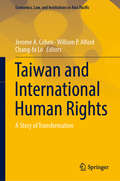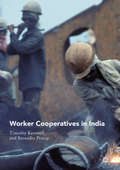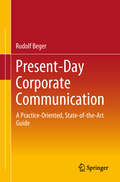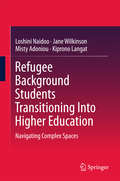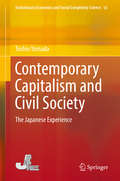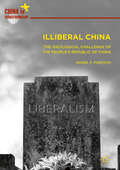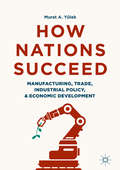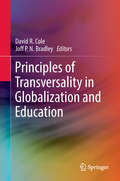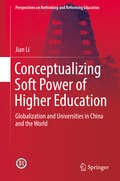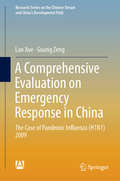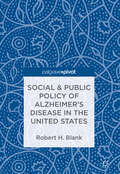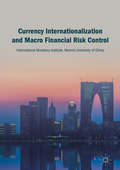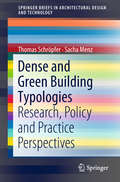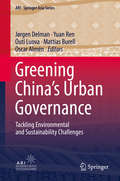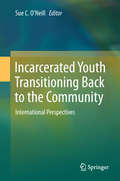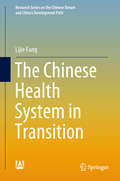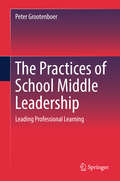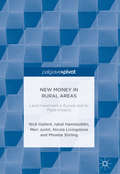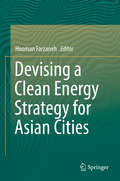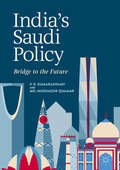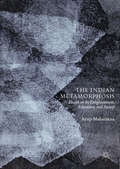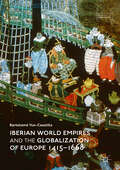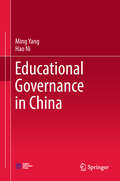- Table View
- List View
Taiwan and International Human Rights: A Story of Transformation (Economics, Law, and Institutions in Asia Pacific)
by Jerome A. Cohen William P. Alford Chang-Fa LoThis book tells a story of Taiwan’s transformation from an authoritarian regime to a democratic system where human rights are protected as required by international human rights treaties. There were difficult times for human rights protection during the martial law era; however, there has also been remarkable transformation progress in human rights protection thereafter. The book reflects the transformation in Taiwan and elaborates whether or not it is facilitated or hampered by its Confucian tradition. There are a number of institutional arrangements, including the Constitutional Court, the Control Yuan, and the yet-to-be-created National Human Rights Commission, which could play or have already played certain key roles in human rights protections. Taiwan’s voluntarily acceptance of human rights treaties through its implementation legislation and through the Constitutional Court’s introduction of such treaties into its constitutional interpretation are also fully expounded in the book. Taiwan’s NGOs are very active and have played critical roles in enhancing human rights practices. In the areas of civil and political rights, difficult human rights issues concerning the death penalty remain unresolved. But regarding the rights and freedoms in the spheres of personal liberty, expression, privacy, and fair trial (including lay participation in criminal trials), there are in-depth discussions on the respective developments in Taiwan that readers will find interesting. In the areas of economic, social, and cultural rights, the focuses of the book are on the achievements as well as the problems in the realization of the rights to health, a clean environment, adequate housing, and food. The protections of vulnerable groups, including indigenous people, women, LGBT (lesbian, gay, bisexual, and transgender) individuals, the disabled, and foreigners in Taiwan, are also the areas where Taiwan has made recognizable achievements, but still encounters problems. The comprehensive coverage of this book should be able to give readers a well-rounded picture of Taiwan’s human rights performance. Readers will find appealing the story of the effort to achieve high standards of human rights protection in a jurisdiction barred from joining international human rights conventions.
Worker Cooperatives in India
by Timothy Kerswell Surendra PratapThis book discusses the experiences of cooperative enterprises in India that have been operated by or influenced to a significant extent by trade unions. It describes the origins of these movements in India presenting a political-strategic view of their development and, in some cases, their decline. The book also presents case studies of groundbreaking social experiments conducted in India in which trade unions have formed cooperatives for production and service provision for the working class movement. It also offers lessons learned from previous social experiments and explains how to use them for future strategies in the working class movement by using primary research undertaken on trade union cooperatives in India. With globalization often given as a reason for the decline of trade unions and transformative social movements, this book demonstrates that where movements declined it was due to their own internal weaknesses, while presenting successful case studies of movements which have shown resilience in the face of globalization. The book also gives an extensive criticism of India’s Self Employed Women’s Association as a model of a depoliticized trade union cooperative. The main lesson of this book is that cooperatives represent a viable strategy to build working class power in the 21st century in India, and elsewhere.
Present-Day Corporate Communication: A Practice-Oriented, State-of-the-Art Guide
by Rudolf BegerThis book serves as an easy-to-read, up-to-date practical guide on professional corporate communication. The key market for this book is the Asia-Pacific region, mainly because there is a gap in know-how in corporate communication among many industry sectors. In addition, at present, one cannot find a lot of educational literature about corporate communication in the market. Therefore, this guidebook closes that gap. In Asia, companies are starting to realize the importance of corporate communication in all areas (external and internal corporate communication, crisis communication (Example: TEPCO) and political communication / government relations / lobbying). This is triggered not only by the recent high profile and success of targeted (political) communication in the USA, but also by the notorious export-orientation of many Asian companies and their increasingly multi-national orientation (fostered by M&A and foreign investments). In addition, the increasing importance of online communication and digital/social media is an important reason why existing guidebooks on corporate communication have to be reassessed and modernized. This book focuses on all major aspects of modern corporate communication, including online / digital communication, and covers new developments, such as “fake news”, “post-truths”, “political correctness”, “the art of bridging” and other new phenomena in the world of (corporate) communication. Simple cartoon-style drawings supplement the text in order to facilitate reading and learning. Corporate communication professional, as well as students and professors in business/management programs, will be given tools to effectively and successfully plan and implement corporate communication strategies and tactics in all major areas.
Refugee Background Students Transitioning Into Higher Education: Navigating Complex Spaces
by Kiprono Langat Misty Adoniou Jane Wilkinson Loshini NaidooThis book is one of the first of its kind to examine the aspirations of refugee background students and accompanies them as they journey through the on-shore stage of settlement, enrolment and participation in the Australian education system. It begins with students’ experiences of on-shore settlement, followed by the move into schooling and finally, the subsequent transition into Australian higher education.Transitioning into higher education is a challenge for many students, particularly for those from under-represented equity groups. For refugee background students, navigating in, through and out of higher education can be particularly complex and challenging. Drawing on rich case studies from longitudinal research into refugee youth and the academic and professional staff in schools and universities who support them, the book provides powerful and compelling narratives and insights into this journey. It untangles the complex nature of transition for students of refugee background in higher education, locating it within broader social trends of increasing social and cultural diversity, as well as government practices and policies concerning the educational resettlement of refugees.
Contemporary Capitalism and Civil Society: The Japanese Experience (Evolutionary Economics and Social Complexity Science #14)
by Toshio YamadaThis book is devoted to analyzing contemporary capitalism both in Japan and in the world economy by using the theoretical framework of the French régulation theory and by revisiting the theory of civil society in postwar Japan. The Japanese theory of civil society proposed unique thinking about “freedom and equality” and “human rights” in the postwar era but could not help to come up with effective concepts for an economic analysis of that capitalism of the period. On the other hand, the régulation theory born in the 1970s is well known by its definition of postwar capitalism as Fordism, based on the elaboration of a new conceptual framework, but it soon proved unable to directly explain Japan’s experience by that central concept of Fordism. Inspired by consideration of Japanese civil society and also by the regulationist framework, the author has forged new analytical concepts such as “companyism” to understand Japanese capitalism including the recent “lost decades”, and he elaborates more carefully the concepts of “growth regime” and “institutional change” to grasp the dynamics of the world economy including today’s neoliberal trend. The original benefits of the book consist in 1) reviving a Japanese theory of civil society in the postwar period, 2) applying the régulation theory to the analysis of contemporary Japan, and 3) offering theoretical reflections on the conception of the world economy. Consequently, the author pays special attention to the relationship between the political and the economic as well as regulationist tools and the theory of civil society’s perspective. The principal message of the book is that capitalism or the market economy must be supported by a sound civil society.
Illiberal China: The Ideological Challenge of the People's Republic of China (China in Transformation)
by Daniel F. VukovichThis book analyzes the 'intellectual political culture' of post-Tiananmen China in comparison to and in conflict with liberalism inside and outside the P.R.C. How do mainland politics and discourses challenge ‘our’ own, chiefly liberal and anti-‘statist’ political frameworks? To what extent is China paradoxically intertwined with a liberal economism? How can one understand its general refusal of liberalism, as well as its frequent, direct responses to electoral democracy, universalism, Western media, and other normative forces? Vukovich argues that the Party-state poses a challenge to our understandings of politics, globalization, and even progress. To be illiberal is not necessarily to be reactionary and vulgar but, more interestingly, to be anti-liberal and to seek alternatives to a degraded liberalism. In this way Chinese politics illuminate the global conjuncture, and may have lessons in otherwise bleak times.
How Nations Succeed: Manufacturing, Trade, Industrial Policy, and Economic Development
by Murat A. YülekThis book assesses developmental experience in different countries as well as British expansion following the industrial revolution from a developmental perspective. It explains why some nations are rich and others are poor, and discusses how manufacturing made economies flourish and spur economic development. It explains how today’s governments can design and implement industrial policy, and how they can determine economically strategic sectors to break out of Low and Middle Income Traps.Closely linked to global trade and (im)balances, industrialization was never an accident. Industrialization explains how some countries experience export-led growth and others import-led slowdowns. Many confuse industrialization with the construction of factory buildings rather than a capacity and skill building process through certain stages. Industrial policy helps countries advance through those stages. Explaining technical concepts in understandable terms, the book discusses the capacity and limits of the developmental state in industrialization and in general in economic development, demonstrating how picking-the-winner type focused industrial policy has worked in different countries. It also discusses how industrial policy and science, technology and innovation policies should be sequenced for best results.
Ecological Wisdom: Theory and Practice (EcoWISE)
by Bo Yang Robert Fredrick YoungThis book offers an introduction to the theory and practice of ecological wisdom (EW). EW is the integration of robust contemporary science with proven cultural and historical practices to identify long-term, sustainable solutions to problems of environmental management and urban design. The book combines theoretical concepts with specific case studies, illustrating the opportunities for interdisciplinary approaches combining historical experience, cultural context, and contemporary science as effective strategies for addressing complex problems confronting metropolitan and rural environmental and resource management in areas such as land use, water management, materials and building engineering, urban planning, and architecture and design. EW transcends the limitations in these fields of the normative approaches of modernity or traditional wisdom by offering a new, synthetic strategy to address socio-ecological issues. By presenting these ideas both theoretically and through existing case studies, the book provides researchers, practitioners and students with a powerful new perspective in developing long-term, resilient solutions to existing socio-environmental challenges. It is intended mainly for those working or interested in the fields of sustainable environmental and resource management, city and regional planning, architecture and design, civil engineering, landscape architecture, and the philosophy of science, particularly those with an ecological or sustainability focus.
Principles of Transversality in Globalization and Education
by David R. Cole Joff P.N. BradleyThis unique book comprehensively covers the evolving field of transversality, globalization and education, and presents creative, research-based thought experiments that seek to unravel the forces of globalization impacting education. Pursuing various approaches to and uses of transversality, with a focus on the ideas of Félix Guattari, it is the only book of its kind. Specifically, it examines the influence of Guattari at the forefront of educational research that addresses, enhances and sets free activist micro-perspectives, which can counter macro-global movements, such as capitalism and climate change. This book is a global education research text that includes perspectives from four continents, providing a balanced and significant work on globalization in education.
Conceptualizing Soft Power of Higher Education: Globalization and Universities in China and the World (Perspectives on Rethinking and Reforming Education)
by Jian LiThis book examines the globalization trends in higher education from an international political science perspective, using Nye’s theory of soft power to explore the rationale behind it. It focuses on conceptualizing the Soft Power Conversion Model of Higher Education, which is embedded in the globalization of higher education, and analyzes the globalization of Chinese higher education reform.Also, this book provides innovative and unique viewpoints on conceptualizing and mapping the globalization and internationalization of higher education, especially for current Chinese higher education (1949-2016). It discusses and illustrates cutting-edge concepts of global higher education, such as global learning, global competency, and global citizenship and refines them in the conceptualized soft power conversion model of higher education.This book reports on and enriches the theoretical concept of global education, and provides practical insights into global learning, global citizenship and global competency for Chinese undergraduate students.
A Comprehensive Evaluation on Emergency Response in China: The Case of Pandemic Influenza (H1N1) 2009 (Research Series on the Chinese Dream and China’s Development Path)
by Lan Xue Guang ZengThis book is a third-party evaluation of H1N1 prevention and control effects in China. Based on the characteristic of H1N1 pandemic around the world and current public health management system in China, this book evaluates the comprehensive effects by considering the countermeasures, joint prevent and control mechanism operated by central and local government, the cost and benefit effects and also the social influence during the whole process. Using the methods of interview and questionnaire, it investigates the central and local government, disease control and prevention center, hospital, community, school and enterprise in Beijing, Fujian, Henan, Guangdong and Sichuan provinces, and also presents the response from the public, patient and close contacts to evaluate the overall effects from different stakeholders. Assessment findings and policy suggestions are included in the book on the way to improve the efficiency of public health emergency system in China. This book provides a good reference to researchers and officials in public management, crisis management and public health studies.
Social & Public Policy of Alzheimer's Disease in the United States
by Robert H. BlankThis book focuses on the public policy and political dimensions of Alzheimer’s Disease and other dementias (AD/D) in the United States, with coverage of the global dimensions and relevant examples from other countries. Starting off with a discussion on the characteristics of AD/D and competing theories of their causes, their human and financial costs, and the increasing burden they place on all societies as populations age, the book examines in detail the range of policy issues they raise. These include funding policies, payment policy and regulatory functions, long-term services and support (LTCS), public health and prevention policies.The book analyses the big business surrounding AD/D and shows that the strong public fear of developing dementia heightens the likelihood of exploitation of vulnerable people looking for a technological fix. It examines both informal and formal caregivers and the heavy burden placed on families, primarily women, and recent policy attempts to strengthen LTCS. It also examines the latest evidence of potential risk-reduction and prevention strategies and the difficult issues surrounding advance directives, assisted suicide, and definitions of death that increasingly face policy makers. It concludes by analyzing the policy implications on possible technological scenarios.
Currency Internationalization and Macro Financial Risk Control
by International Monetary InstituteThis book collects expert opinions, research, and risk assessments from within the Chinese financial policy establishment on prospects for the internationalization of the renminbi as a reserve currency around the world. As China's economy diversifies in the acquisition of global assets, the renminbi may partially displace the dollar or yen as a reserve currency, with unpredictable and profound potential consequences. This book, presenting for the first time in English, the Chinese perspective on the internationalization of the Chinese currency will be of great value to central bankers, financiers, and students of international finance.
Whither Capitalism?: Internalizing the Market and Free Investment
by Makoto NishibeThis book is the first to clarify the essential meaning and serious impact of globalization at the most abstract level from the point of view of Polanyi's three socioeconomic principles of exchange, reciprocity and redistribution. It also provides a theoretically coherent explanation of the evolution of the market and capitalist economies with respect to the advancement of commodification through Marx's internalization of the market into the community and state.Globalization is the long-term tendency of the market to extensively expand and deepen, and of the community and state to contract and become shallower. The ultimate goal of globalization is free investment capitalism for all people – not only capitalists and speculators, but workers, students, and housewives as well.The book also examines Hayek's criticism of a centrally planned economy and Lange's proposal of market socialism in the “Socialist Calculation” debate, which has been ongoing since the 1920s, and acknowledges Hayek's vision of a distributed market with local and tacit knowledge to explain why socialism is infeasible and capitalism is robust.The outcomes of globalization are disastrous in socioeconomic, cultural and ecological realms. As such, it argues that in the twenty-first century, a post-capitalist, cooperative market economy mediated by new forms of money as communication media must be achieved. These new media will include community currencies and local exchange trading systems (LETS) that can maintain the merits of money and the market and can overcome the defects of free investment capitalism.Lastly, this English version of the book includes a postscript explaining the significance and prospects of the socioeconomic changes around the globe since the publication of Japanese version in 2011.
Dense and Green Building Typologies: Research, Policy and Practice Perspectives (SpringerBriefs in Architectural Design and Technology)
by Thomas Schröpfer Sacha MenzIn this book, academics, policy makers, developers, architects and landscape architects provide a systematic review of the environmental, social, economic and design benefits of dense and green building types in high-density urban contexts and discuss how these can support higher population densities, higher standards of environmental sustainability and enhanced live ability in future cities.
Greening China’s Urban Governance: Tackling Environmental and Sustainability Challenges (ARI - Springer Asia Series #7)
by Jørgen Delman Yuan Ren Outi Luova Mattias Burell Oscar AlménThis volume examines how urban stakeholders in China – particularly city governments and social actors – tackle China’s urban environmental crisis. The volume’s case studies speak to important interdisciplinary themes such as new tools and instruments of urban green governance, climate change and urban carbon consumption, green justice, digital governance, public participation, social media, social movements, and popular protest. It lays out a unique theoretical framework for examining and discussing urban green governance. The case studies are based on extensive fieldwork that examines governance failures, challenges, and innovations from across China, including the largest cities. They show that numerous policies, experiments, and reforms have been put in place in China – mostly on a pragmatic basis, but also as a result of both strategic policy design, civil participation, and protest. The book highlights how China’s urban governments bring together diverse programmatic building blocks and instruments, from China and elsewhere. Written by experts and researchers from different disciplines at leading universities in China and the Nordic countries in Europe, this volume will be of interest to researchers and students who are interested in Chinese politics, especially urban politics, governance issues, and social movements. Both students and teachers will find the theoretical perspectives and case studies useful in their coursework.The unique green governance perspective makes this a work that is empirically and theoretically interesting for those working with urban political and environmental studies and urbanization worldwide.
Incarcerated Youth Transitioning Back to the Community: International Perspectives
by Sue C. O’NeillThis book offers a broad overview of transition practices for incarcerated youth, shaped by local culture, politics, ideologies, and philosophies. It highlights the similarities and differences in international approaches, as well as promising practices. The book is divided into two sections: Section One presents a synthesis of the current research on essential areas shown to promote successful transitions for incarcerated youth, using the Taxonomy for Transition Programming 2.0 as a cohesive framework, Section Two focuses on national perspectives on topical issues impacting local transition practices and/or policy. It provides information pertaining to the respective countries and a summary of key facets of their juvenile justice system, including successful or promising approaches and programs used in transition. This book benefits academics and researchers from a broad range of fields, policy makers and leadership teams from various agencies, associations, and government departments with an interest in juvenile and youth justice, social work, and special education courses on transition planning.
The Chinese Health System in Transition (Research Series on the Chinese Dream and China’s Development Path)
by Lijie FangThis book provides an overview of the ongoing transition in China’s health system, especially focusing on the new healthcare reform initiated in 2009. First, it reviews the changes in China’s healthcare system from the 1950s to 2008, establishing the situation when the reform was introduced. The book subsequently analyzes the social and economic context in which the health system is embedded. Since the primary focus is on the new healthcare reform, the book introduces the blueprint and the year-for-year development of the new healthcare reform, as well as the specific reforms in health financing, public hospitals, and primary care. Given its central importance in the health system, the book also described major trends in long-term care in the past several years. In addition, it examines the health policy-making process with a case study of the New Cooperative Medical Scheme of China. Lastly, the book assesses the performance of China’s health system and predicts future developmental trends.
The Practices of School Middle Leadership: Leading Professional Learning
by Peter GrootenboerThis book uses practice theory to examine the role of ‘middle-leadership’. In particular, it investigates the practices of ‘leading in the middle’ in the cultural-discursive, material-economic, and social-political domains – i.e., the sayings, doings and relatings of middle leading. This perspective acknowledges the ecological arrangement of leading practices in schools, and the necessity of considering the unavoidable reality of the site. The analysis is used to promote the need to view leading in the middle as a form of praxis – a morally and ethically informed practice that requires thoughtful decision-making and action in situations where the outcomes are not always clear. This book focuses on the practice of leading for those in ‘middle management’ positions in primary and secondary schools, such as those responsible for curriculum leadership, including senior teachers, assistant principals, and curriculum leaders. In their positions that bridge ‘management’ and ‘the classroom’ they are significant leaders in promoting and sustaining effective pedagogy for good learning outcomes, and they have to continue to provide high-quality teaching in their own classrooms, while simultaneously being a mentor, coach, supporter and evaluator for their colleagues.
New Money in Rural Areas: Land Investment in Europe and Its Place Impacts
by Nick Gallent Iqbal Hamiduddin Meri Juntti Nicola Livingstone Phoebe StirlingThis book examines the flow of investment into rural land assets in Europe, particularly farmland, woodland and wineries, but extending also to leisure uses such as golf courses and theme parks. It explores the characteristics of investors in rural land and their motivations before undertaking an analysis of the place impacts of investment, viewing ‘new money’ as a potential development opportunity, delivering a variety of outcomes for local landscapes and communities. After providing introductory insights into rural land investment and the measurement of associated impacts, ten case studies – from different European locations – explore actual investment motives and local impacts. The book concludes with a synthesis of investment experiences and an assessment of the transformative changes brought to rural areas by the flow of new money.
Devising a Clean Energy Strategy for Asian Cities
by Hooman FarzanehThis book capitalizes on two hot topics: the Low Carbon Emission Development Strategies and climate change in Asian cities. There is resurgence in making policies to investigate more aspects of the energy-environment spectrum for the global energy market in the future. This book helps the policy makers and researchers to understand which actions should be taken to reduce the environmental impacts of economic activities in different regions in Asia. The clean energy strategy proposed in this book refers to the development and implementation of policies and strategies that simultaneously contribute to addressing climate change and solving local environmental problems, which also have other development impacts. It provides insights to a wide audience on successful ways to promote, design and implement the clean energy policies in Asian cities. To determine the global actions, it is necessary to make breakthroughs by promoting further research and to present scenarios that achieve Low Emission Development Strategies (LEDS) goals without dependence upon fossil fuels. The scenarios and case studies discussed in this book are helpful to plan for the SDGs, where various objectives have to be achieved at the same time. The UN 2030 development agenda needs innovative planning to achieve multiple goals with limited resources and generate synergy among sectors. This book will be one of the first books available on this subject.
India's Saudi Policy: Bridge to the Future
by P. R. Kumaraswamy Md. Muddassir QuamarThe book traces India’s Saudi Policy and locates the current state of bilateral relations and the challenges it faces. It argues that during the Cold War the relations were largely shaped by the Pakistan factor which in turn inhibited both sides from exploring the importance and value of one another. As a result, the relations were largely transactional and marginal. The end of the Cold War coincided with two interesting developments, namely, significant growth in India’s economic power and influence and the de-hyphenation of Pakistan from its Middle East policy. This resulted in greater political engagements between India and Saudi Arabia and was strengthened by the growing energy trade ties. For long expatiate population and haj have been the backbone of the relations, and they have been new instruments as India looks to enhance its engagements with the Kingdom through investments opportunities, political contacts, shared security concerns and strategic cooperation. India’s Saudi policy, however, face many challenges most importantly the regional instability, the Iran factor, low oil price and the international dynamics. The book will be the first comprehensive work on the India-Saudi relations. Though targeting a wider audience, it will be academically grounded and based on primary sources collected from India and Saudi Arabia.
The Indian Metamorphosis: Essays on Its Enlightenment, Education, and Society
by Arup MaharatnaThis book examines various ideational, attitudinal and intellectual impasses that are becoming glaringly apparent on several fronts, and which have held back India’s balanced, steady and uniform development and transformation post-independence. It argues that all of these ideational and attitudinal aberrations stem from one basic fact, namely that India, throughout the entire period since the onset of modern industrial secular civilization at the global level, has somehow managed to evade the core ideas and values of the western Enlightenment movement, leaving unfinished the crucial task of modernizing and secularizing the mindsets and outlooks of its people on a mass scale – a task that has historically and globally been the backbone of sustained modern material development with socio-political stability. Further, it suggests that this enormous failure is crucially linked to key shortcomings in Indian mainstream thinking, and the imaginations and visions in general, and as such is also linked with confused educational ideas and content – particularly at the elementary level – since the country gained independence. The book maintains that Indian curricula and educational content at the school level has been consciously designed to guard against the core values and ideas of the Enlightenment, which could have made the typical Indian mind more rational, reasonable, mature and secular, resulting in much lower degrees of unreason, raw sentiments and emotions than have been hitherto entrenched in it. The book further sketches the genesis and impact of the currently dominant neoliberal ideas and thinking that have invaded the entire educational universe and its philosophy around the world. Lastly, it examines and assesses the latter’s far-reaching ramifications for current Indian educational philosophy, pedagogy and practices, and proposes concrete remedial directions for public policy and action.
Iberian World Empires and the Globalization of Europe 1415–1668 (Palgrave Studies in Comparative Global History)
by Bartolomé Yun-CasalillaThis open access book analyses Iberian expansion by using knowledge accumulated in recent years to test some of the most important theories regarding Europe’s economic development. Adopting a comparative perspective, it considers the impact of early globalization on Iberian and Western European institutions, social development and political economies. In spite of globalization’s minor importance from the commercial perspective before 1750, this book finds its impact decisive for institutional development, political economies, and processes of state-building in Iberia and Europe. The book engages current historiographies and revindicates the need to take the concept of composite monarchies as a point of departure in order to understand the period’s economic and social developments, analysing the institutions and societies resulting from contact with Iberian peoples in America and Asia. The outcome is a study that nuances and contests an excessively-negative yet prevalent image of the Iberian societies, explores the difficult relationship between empires and globalization and opens paths for comparisons to other imperial formations.
Educational Governance in China
by Hao Ni Ming YangThis book presents a comprehensive and cutting-edge overview of the educational governance reform trajectory and the latest issues in China, addressing several important topics such as administration, internal management, provision, enrollment, employment, financing, examinations, evaluation and quality assurance. In addition, this important and timely book discusses the educational system at all levels, from primary and secondary schools to colleges and universities, and each chapter ends with a discussion of the status quo, problems facing China and coping strategies for further reform. The past 68 years (1949-2016) have seen a sea change in social, economic, cultural, political and educational fields. Systematically describing the educational landscape in China, the book also reveals how the massive changes in China have shaped education, and how education has responded to the new demands placed on it.Offering essential insights into educational reform in China, the book represents a valuable resource, especially for researchers and graduate students in the field of education.
